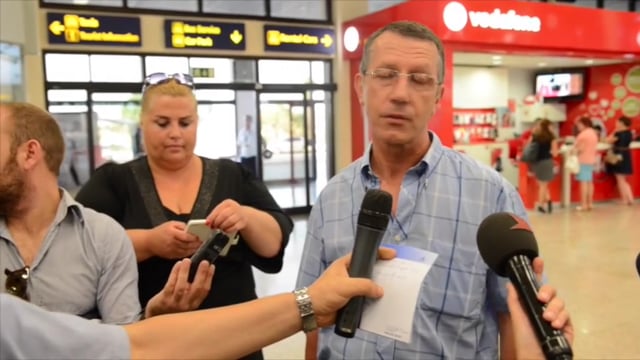[WATCH] Maltese man accuses government of abandoning oil workers in Libya
Maltese oil worker in Libya says there is grave danger in Libyan desert, calls on government to carry out “immediate evacuation.”


A Maltese oil worker, and a former colleague of abducted man Martin Galea, has today told journalists that his pleas for help went unheeded for three weeks by the Maltese government and the foreign affairs ministry.
Speaking to members of the press who were present at the airport, Saviour Brincat, an oil worker who has been working in Libya for the past 25 years, insisted that he received no support or concrete solutions from the Maltese government, and instead he only received “moral support."
“I have been trying to get out of the Libyan desert for three weeks, but to no avail. All I was offered was moral support. The Maltese government, the foreign affairs ministry, or the crisis centre only told me to wait, and said that they would try to get me out. I received no other help,” he said.
Brincat, who works for oil company Nageco, explained that was living 1,000 km away from Tripoli, and about 100km away from Brega.
“Since 15th July, I have been in constant contact with the Maltese authorities, I have sent several emails and have called them numerous times. However, I was not offered any concrete solutions as to how I am going to get out of the desert.”
“When you are in the desert, you have to book a flight at least three days before, but because of Eid, the flights were cancelled. I only managed to arrive in Malta out of my own will, and after catching three flights,” he said.
Moreover, Brincat said that the tension in the Libyan desert is escalating, and that roads in and around the desert are very dangerous and strive with gunshots and fighting militia.
“Three days ago, I sent an email to the government warning of the danger in the desert. I only received an acknowledgement to my email, and to date no other response,” Brincat said while arguing that the government might have taken umbrage at his email.
“The Maltese people in Libya need to be evacuated immediately. Take care of the Maltese people in the desert,” he said.
The Maltese oil worker explained that it is not easy for the Maltese people to get out of Libya, as using the roads can be very dangerous. Brincat also argued that the tension in Libya is also bringing huge danger to the people in the desert.
When asked what the danger was, Brincat did not divulge any additional details, and criticised Martin Galea for disclosing details to the press.
“At this point, it is enough to say that they hijacked three vehicles from us,” he said.
Meanwhile, Maria Muscat, the foreign affairs communications coordinator, who was nearby awaiting the arrival of a three-year-old Eritrean boy from Libya, declined to comment to the press, arguing that she must first liaise with minister George Vella.
On his part, Olaph Terribile, the private secretary for the foreign affairs ministry, insisted that the government is in “constant contact” with all the Maltese in Libya.
While declining to specifically comment on Saviour Brincat’s comments, Terribile said that the foreign affairs ministry is offering the Maltese in Libya a “choice of flights, as well as their transportation from their location.”
Terribile said that comments are premature at this stage, but underlined that all Maltese people are being contacted. Moreover, he said that the authorities will carry out an analysis on the communication logs between the foreign affairs ministry, the Maltese embassy in Libya, and Saviour Brincat,
“The Maltese people in Libya are being offered numerous flights and other modes of transportation to flee Libya. Some of these options are free of charge, but notwithstanding this, some opt to stay in Libya,” Terribile said in comments to Malta Today.
Asked about the increasing danger in Libya – most notably Tripoli and the desert – Terribile acknowledged the increasing danger, but failed to divulge into details as to what constitutes the additional danger.






.jpg)
















